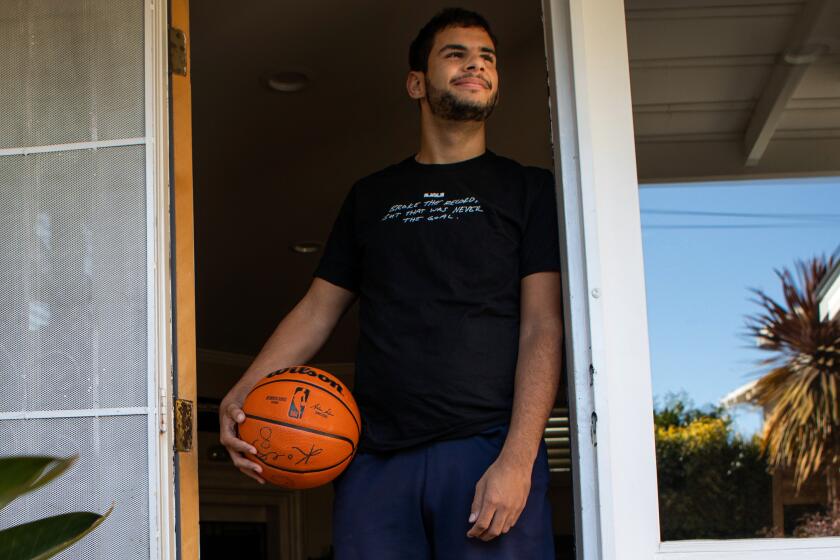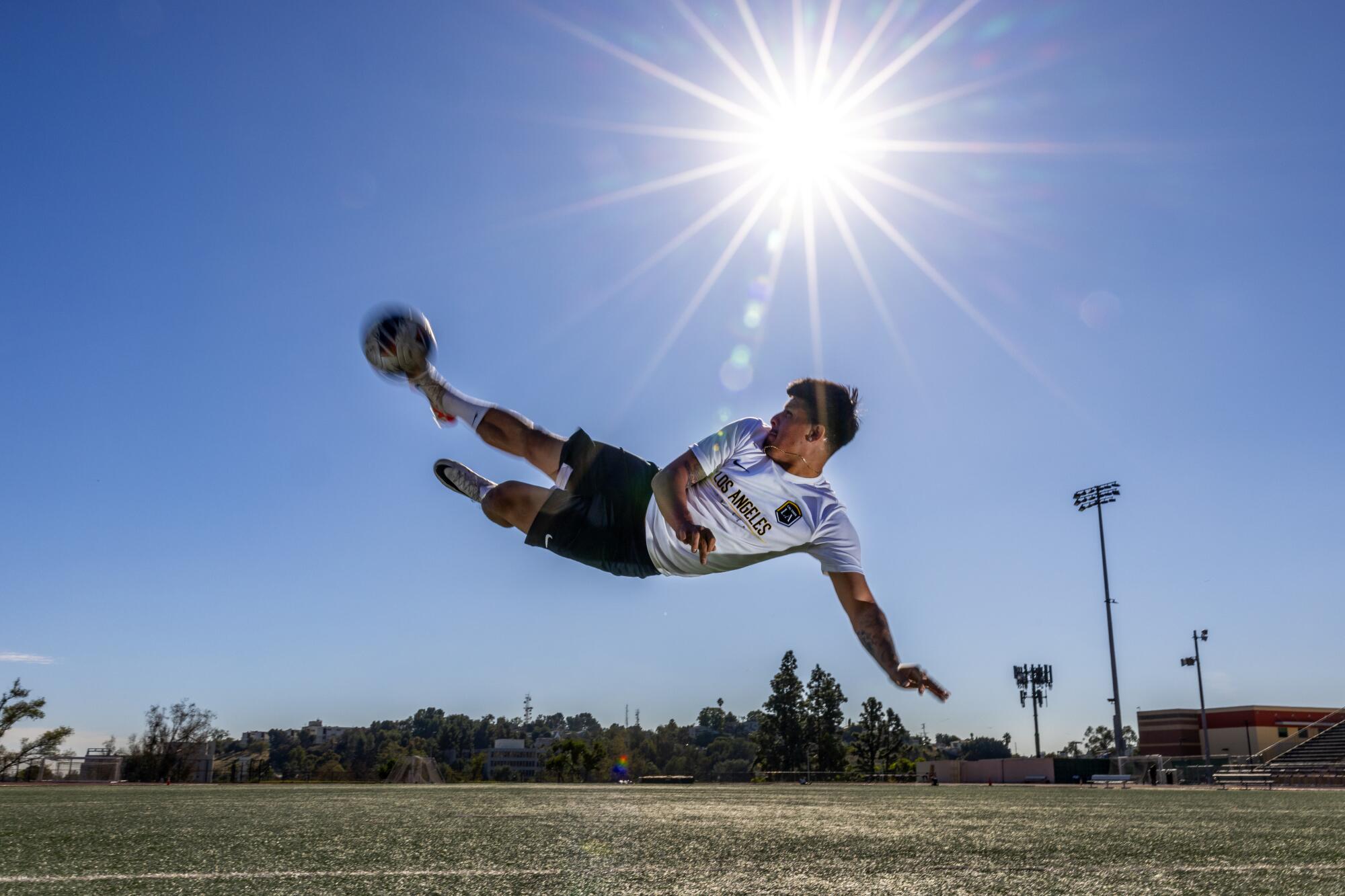
- Share via
Bryan Ortega isn’t sure how his slide started, but he knew how it was going to end.
After being kicked out of high school, jailed for robbery and winding up homeless in the middle of a pandemic, Ortega had fallen about as far as he could fall. The next step down probably would be fatal.
“I was going through a dark time,” he says. “I didn’t want this for my life. I didn’t want to be the kid ... in jail. I didn’t want people to see me as a bad person.”
So a year and a half ago he played the only card left in his deck and asked Michael Erush, the first-year soccer coach at Cal State Los Angeles, to give him another chance. Two seasons later, Ortega not only has become an all-conference forward who has carried the fourth-ranked Golden Eagles to a third straight California Collegiate Athletic Assn. title, but he’s also a sociology major on track to graduate with honors next spring.
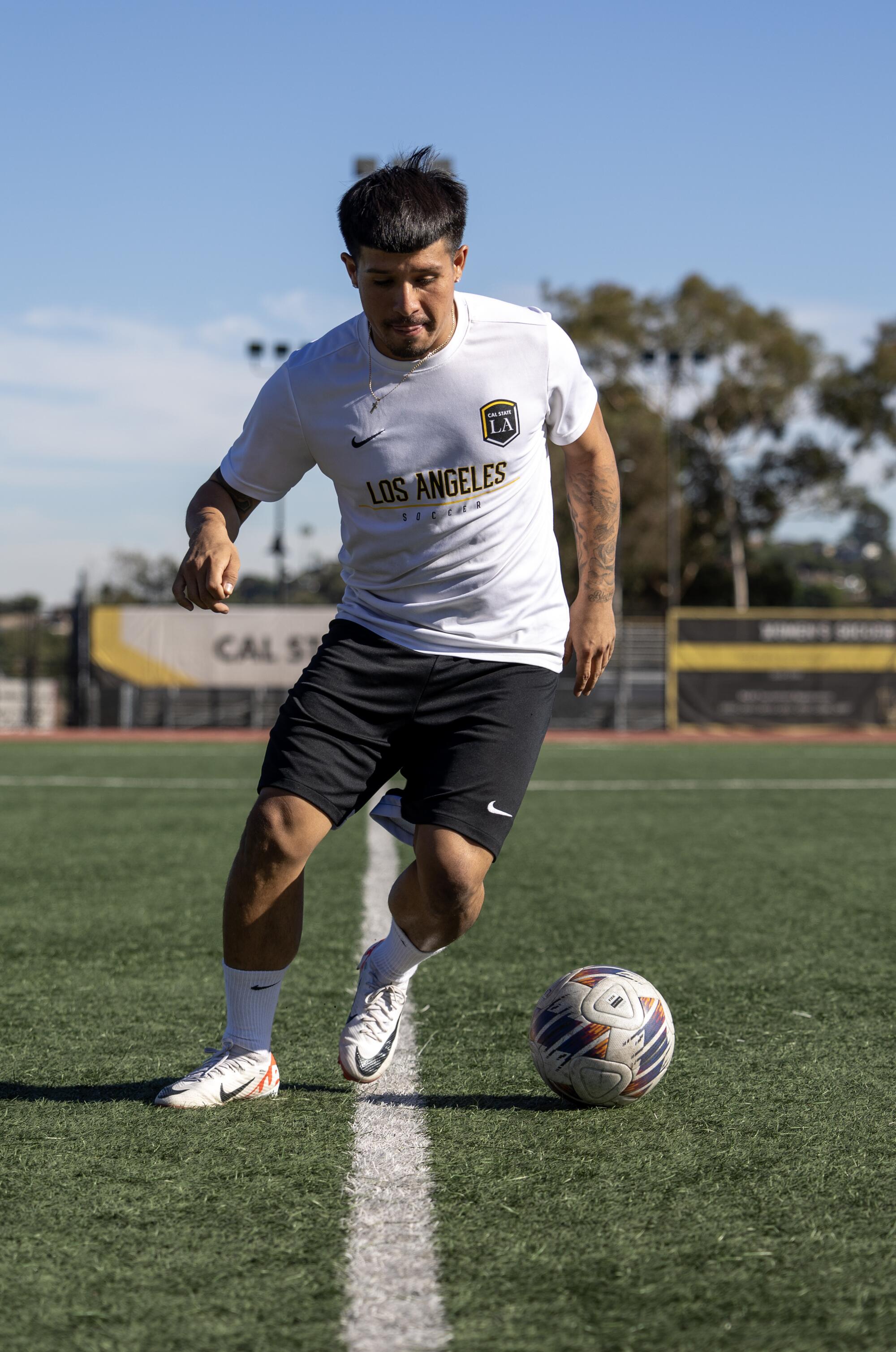
“Soccer,” Ortega says, his voice catching with emotion, “saved my life. If not, it would have been the same route.”
Well, soccer and Erush. Giving Ortega a jersey was a huge gamble for a rookie coach who inherited a program coming off a national championship. But the opportunity to impact lives, not just win soccer games, was a big reason he wanted the job at the East L.A. school in the first place.
“The surrounding area of Cal State L.A., there’s kids that need second chances,” he said. “They have to learn the hard way, but I think it’s really important to understand that kids do make mistakes, they put themselves into bad situations and then they have to learn from it.
“Just like in the game. You make a mistake, you have to focus on the next play.”
In a way, Erush said, he was just paying it forward. As a standout player at North Hollywood High 25 years ago, Erush was a self-described troublemaker, one who was frequently suspended and surrounded by gangs.
“I was a bad, bad child,” he said.
But then a coach reached out and saved him. During his junior year, Erush got a recruiting letter from Sigi Schmid, who had just taken UCLA to a national championship and would later guide the Galaxy and Columbus Crew to MLS Cup titles. Buoyed by the news that a coach of that caliber had noticed him, Erush rededicated himself. He escaped the gangs by transferring to Birmingham High for his senior year and buckled down both in the classroom and on the field.
He went on to lead Loyola Marymount to three NCAA tournament appearances, earn two degrees and get inducted into the school’s hall of fame. He also played professionally for four teams in two countries.
“The one person that changed my life,” Erush said, “was Sigi Schmid.”
Erush wanted to do the same for Ortega, whom he had followed since the 25-year-old forward’s days in high school and junior college, where Ortega was an all-conference player. But Erush wasn’t interested in sticking his hand out if Ortega wasn’t going to use it to pull himself up.
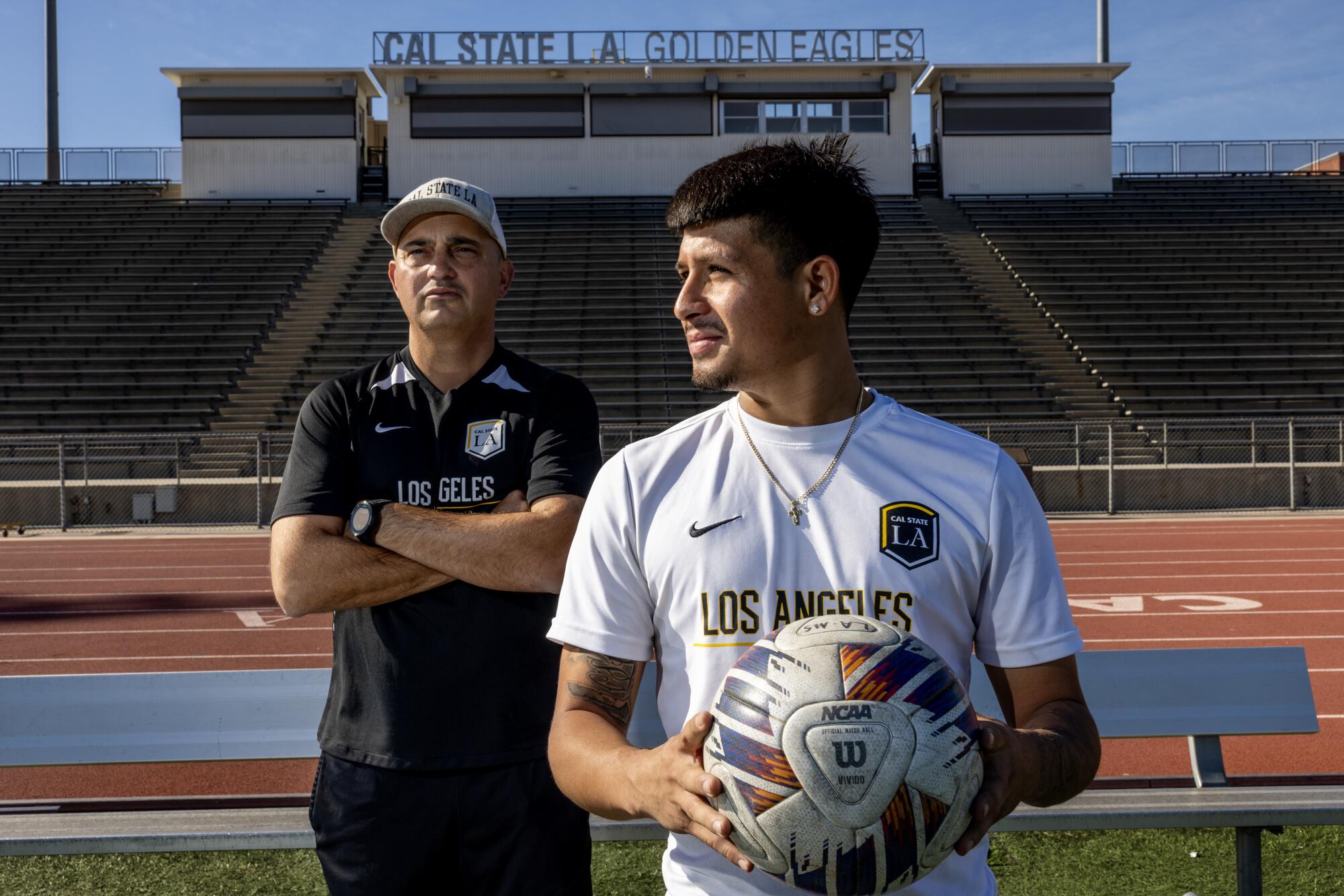
“It was a pretty intense evaluation period,” Erush said, speaking from behind his desk in the small office he shares with his two assistant coaches and the crush of trophies his team has collected over the years. “I truly do believe if you manage and lead correctly, it’s going to work out. We have a staff that helps us. We have an academic advisor that works with him. We went above and beyond to make sure that he’s successful. And it took all of us, not just me.”
That leadership and teamwork is reflected in Cal State L.A.’s record: the team is 31-3-5 since Erush, then an assistant, was promoted to replace coach Chris Chamides following the 2021 championship season. It hasn’t been easy though. Many players come from challenging backgrounds and the school offers only athletic grants in aid, which are far less robust than traditional scholarships.
Nor is there a training table or athletic cafeteria, as there are at bigger schools; instead, some players visit a food pantry once a week to help stretch their financial aid. But it works because Erush and his staff have turned their team into a family. What players can’t find at home or on the streets they find in the locker room, in the cramped office or on the field.
“Everyone on the team cares for each other,” Erush said. “Am I always worried about gangs? Yes, but we surround ourselves with good people and we expect them to be good student-athletes. The bottom line is I want these guys to be good human beings.”
No one has benefited from that approach more than Ortega.
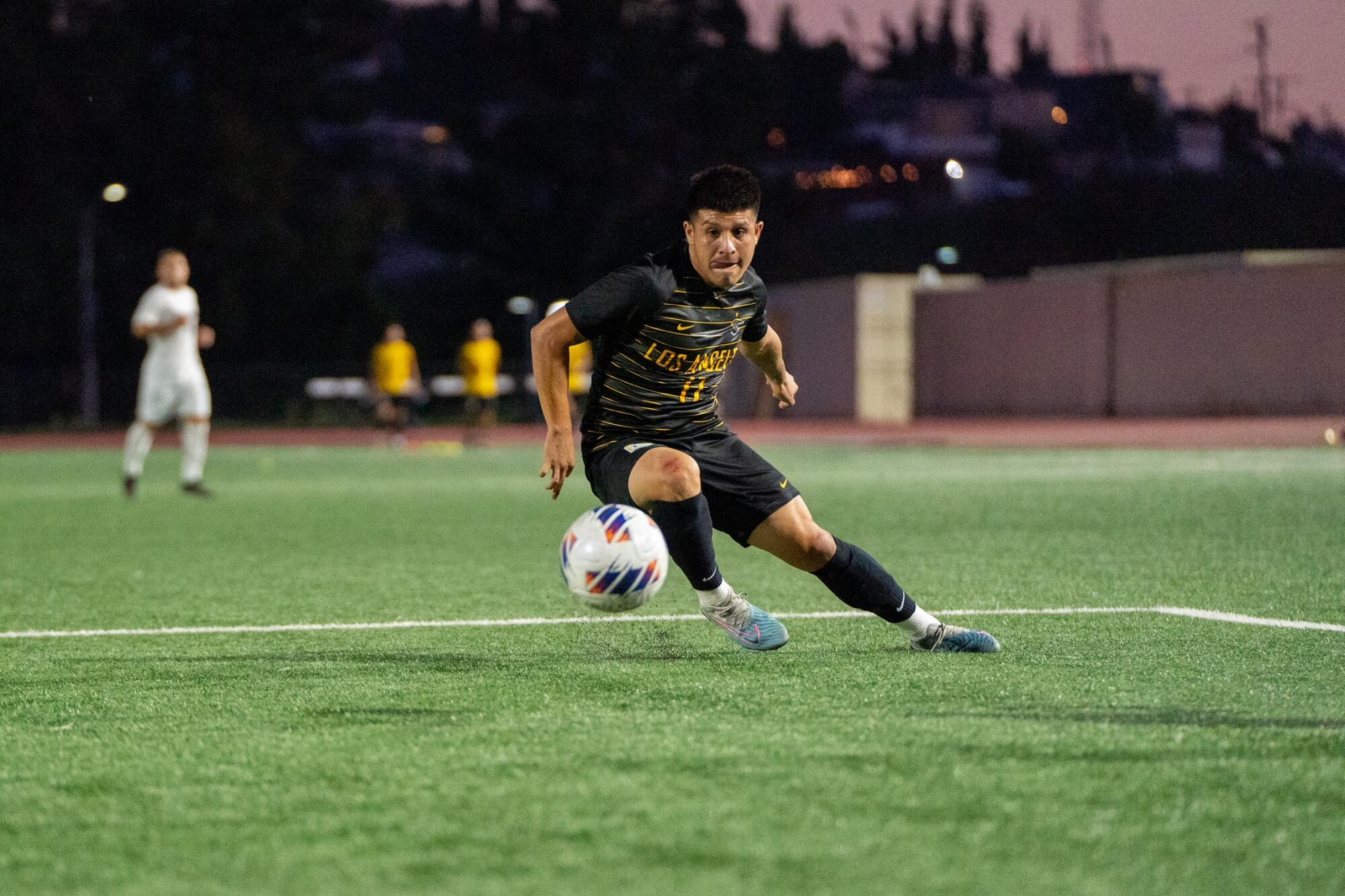
“I told him ‘I know my life’s not perfect now. I want to change that.’ If he could help me find a school where I could play, I would completely change as a person.”
— Bryan Ortega, on what he told Cerritos assistant coach Jose Esparza as he tried to turn his life around.
A standout player at Paramount High, Ortega didn’t bring that same discipline to his studies and wound up being sent to an alternative school in his senior year. His grades didn’t get much better during two years at Cerritos College, where he had 21 goals and 10 assists in 45 games but struggled in the classroom.
But his real troubles began about three months after his final game there when he got in a fight at a park in Compton. Ortega returned hours later to settle the score by robbing his assailant, only to be quickly arrested.
“I was in the wrong place, wrong time that day,” Ortega said, voice barely above a whisper.
He said he spent less than three weeks in the Twin Towers jail downtown, but that was long enough to cost him his job delivering cars for a Porsche dealer. Unable to find a new job during the pandemic, he spent months living with his parents in their car.
Basketball saved Kade West after the deaf, autistic athlete lost his mom. But other hurdles nearly derailed his athletic dreams at Cerritos College.
“It was really hard,” he said. “You couldn’t shower. You couldn’t be clean. Sometimes we wouldn’t eat.”
Ortega told himself he was done with soccer, but he needed the game more than ever. His first call was to Cerritos assistant coach Jose Esparza.
“I told him, ‘I know my life’s not perfect now. I want to change that’,” said Ortega, whose angular face is bracketed by tiny earrings in each ear. “If he could help me find a school where I could play, I would completely change as a person.”
That school turned out to be Cal State L.A. But Erush needed to be convinced Ortega was serious before he would be offered a place on the team.
“I enjoy hard conversations,” said Erush, whose direct, no-nonsense manner is part tough love and part compassionate teddy bear. “One of my strengths is making sure if I bring a player into our culture, that he understands what it is to be here. He knew what he wanted. We knew what we wanted. It was low risk, believe it or not.”
Ortega has kept up his end of the bargain, excelling in the classroom and on the field, where his 10 goals in 17 games ranked second in the CCAA this season. Cal State L.A (17-1-2) will play in the third round of the NCAA Division II national tournament Dec. 1 in Wichita Falls, Texas, against Cal Poly Pomona, a team it already beat twice this season, in regulation and again on penalty kicks after the CCAA championship match ended in a draw.
It’s been a blessed journey for Ortega, who’s sharing a small, two-bedroom Long Beach apartment with his parents and four siblings. Hardly paradise, but it beats a jail cell or the back seat of a car.
“I completely see myself as a different person,” said Ortega, who at 5 feet 8 and 162 pounds is stocky but deceptively fast for a forward. “I can’t believe I’m here. Like, it doesn’t seem real.”
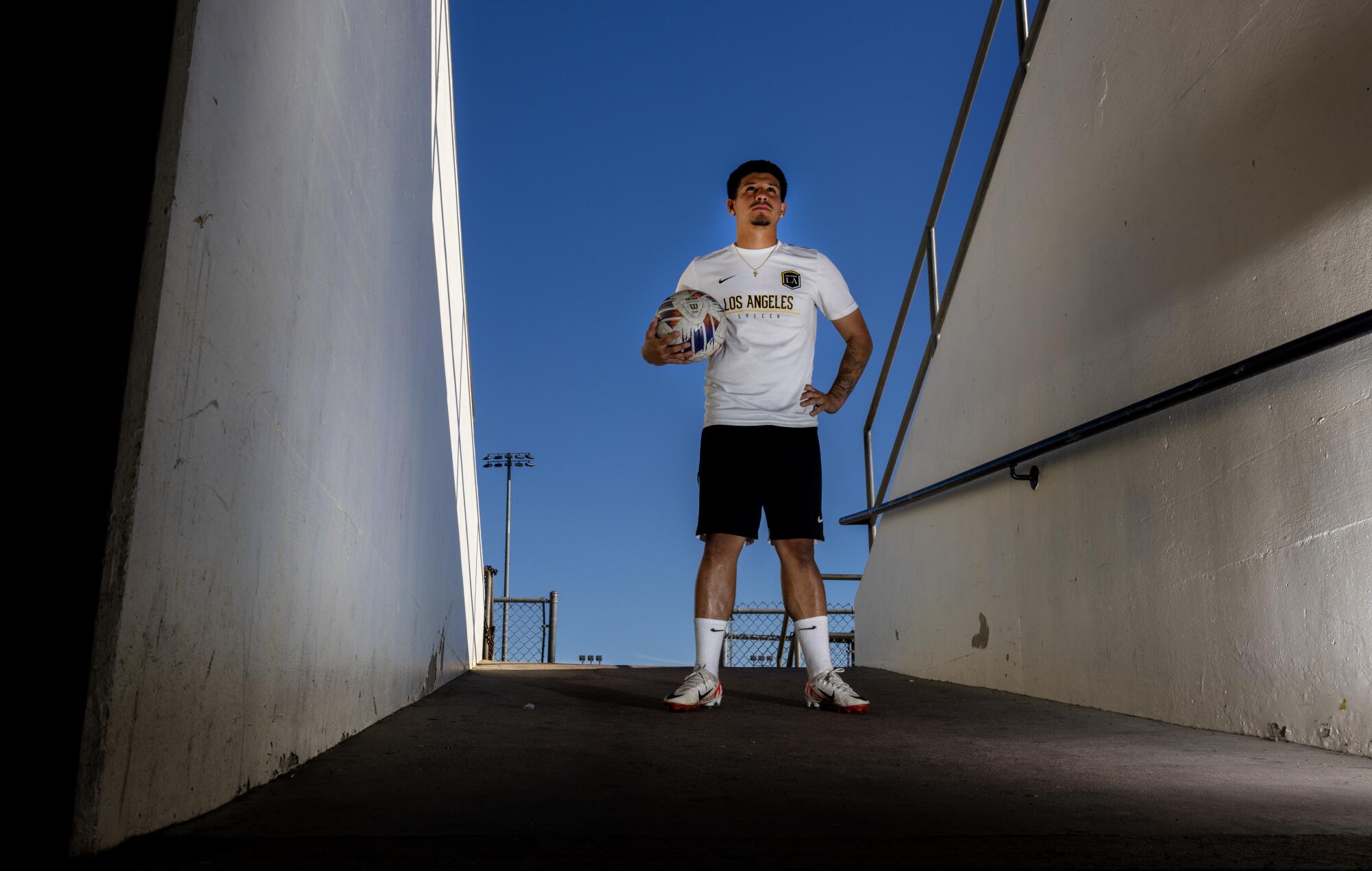
Erush sees it too. That’s why the statistic the coach quotes most frequently when talking about Ortega isn’t 16, the number of goals he’s scored in two seasons, or six, the number of game-winners. It’s 3.6, the player’s grade-point average.
“What I like about Brian is he learns now,” Erush said. “He’s matured. He’s flourishing into an unbelievable human being. That’s why we’re here every single day, working with student-athletes from all different cultures and generations: to get them across the finish line.
“As much as I would say I love winning different championships, it’s just as important to make sure I graduate student-athletes who are good people.”

